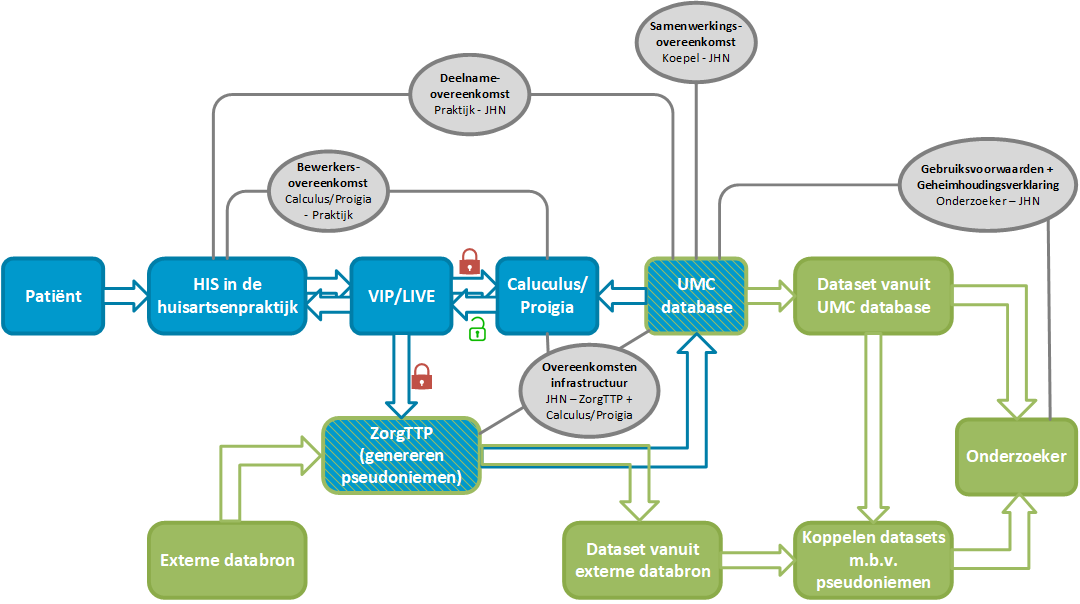
The Julius General Practitioners Network (JHN) has a database of primary care routine data. Using this data, we can conduct data-driven healthcare innovation research. The JHN is an intensive collaboration between the Department of General Practice & Nursing Science at the Julius Center of UMC Utrecht and general practices in the Utrecht region. It is a network of approximately seventy general practices with two hundred general practitioners and over 450,000 patients in the Utrecht area. By contributing to scientific research and innovation, JHN helps improve the quality of general practice care for both the present and the future, and responds to developments in healthcare. The Department of General Practice at UMC Utrecht manages the JHN on behalf of the participating general practitioners. The JHN is run and maintained by the JHN team, which consists of a general practitioner coordinator, data manager, projectmanager, general practitioner researcher, and secretary.
The JHN database contains registered data from the electronic medical records of the participating general practices. This includes coded data such as symptoms and diagnoses (ICPC-codes), medication (ATC-codes), test results (e.g., laboratory and blood pressure), and text notes entered by healthcare providers in the medical records; the so-called free-text fields, or SOEP data.
Intercity
JHN has a close collaboration with general practitioner networks from Amsterdam, Groningen, and Maastricht, called Intercity. This collaboration increases the efficiency and impact of conducting research across multiple general practitioner networks. The processing of data and procedures are aligned, allowing data from these networks to be analyzed together effectively. This ensures that large-scale studies are possible. Deze samenwerking vergroot de efficiëntie van en slagkracht voor het doen van onderzoek in meerdere huisartsen-netwerken tezamen. De verwerking van gegevens en procedures zijn op elkaar afgestemd waardoor data uit deze netwerken goed gezamenlijk te analyseren zijn. Dit zorgt ervoor dat grote onderzoeken mogelijk zijn.
What happens with the data?
JHN has a close collaboration with general practitioner networks from Amsterdam, Groningen, and Maastricht, called Intercity. This collaboration increases the efficiency and impact of conducting research across multiple general practitioner networks. The processing of data and procedures are aligned, allowing data from these networks to be analyzed together effectively. This ensures that large-scale studies are possible.
Through Proigia/Calculus and ZorgTTP, the data are transferred to the JHN-database. All data are stored and managed in accordance with the applicable rules and privacy legislation.
Figuur 1. Overzicht van betrokken partijen en overeenkomsten bij JHN.

Researchers or parties wishing to analyze data from the JHN network, or conduct research in general practice, should submit an application to the JHN steering committee. This steering committee consists of GPs from the Utrecht GP cooperatives, the JHN team, and researchers from the Julius Center of the UMC Utrecht. The general practitioner representatives from the health care umbrella organizations sit on the JHN Steering Committee in a personal capacity, not as the governing body of the health care umbrella organization.
The JHN Steering Committee assesses whether a request is relevant for the general practice, whether the research question can be answered with the data, whether the research is feasible in practice, whether the methodology is sound, whether applicable laws and regulations have been complied with, and whether sufficient expertise in general practice is involved in the research. After a positive assessment, the data can be shared with the researcher, or permission is granted for researchers to approach general practices in the network for participation in the research.


